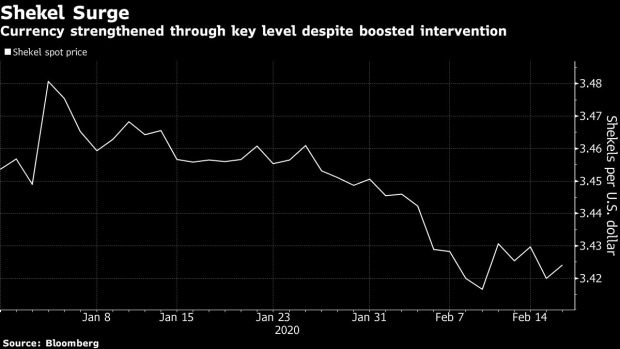(Bloomberg) --
An interest-rate cut may be back in play for the Bank of Israel as its policies appear increasingly in flux.
With the country’s first bout of falling consumer prices in almost three years on the horizon, the central bank might be forced to adjust a policy blend that’s failed to nudge Israel’s inflation higher over the past year. Goldman Sachs Group Inc. predicts Israel’s first rate cut since 2015 could come already on Monday.
To hold the line against an appreciating shekel, the central bank has preferred to intervene in the currency market over cutting borrowing costs. But despite its biggest spate of foreign-exchange purchases in a decade, the shekel’s rally has been such a drag on inflation that declines in consumer prices are possible from next month.
“Inflation in Israel is crashing and expected to fall during one of the coming months into negative territory,” said Amir Kahanovich, chief economist for Phoenix-Excellence investment house, in a note. “The Bank of Israel’s foreign-currency purchase tool is near exhaustion.”
While a rate cut could soon be on the table, most economists surveyed by Bloomberg still predict the Bank of Israel will hold its benchmark at 0.25% on Monday. Policy makers may also have to pick from a menu of less orthodox options, from bond purchases to an unsterilized intervention, in which the central bank doesn’t insulate its domestic money supply from foreign-exchange transactions.
Chances of a rate cut, particularly during the next quarter, have risen largely due to a decline in inflation, according to Modi Shafrir, chief strategist for Mizrahi Tefahot’s finance division.
The deadly outbreak of the coronavirus, which has hammered the global economy for the past month, could also prompt new measures from the Bank of Israel -- particularly if major central banks ease policy.
New Balance
After voting narrowly in favor of a hold in October, the balance on the monetary committee has shifted in favor of buying foreign currency as a way to loosen policy.
The pendulum could swing again because this week, the monetary committee will be at its full complement of six members for the first time since 2018, after Governor Amir Yaron appointed a new deputy in Andrew Abir and made another internal promotion.
Previously in charge of foreign-currency purchases, Abir told the Globes financial newspaper this month that there’s been “no change” in the central bank’s approach and interventions remain its preferred tool.
January’s inflation rose less than forecast to an annual 0.3%, well below the target range of 1% to 3%.
The central bank blames the appreciating shekel for capping prices. In early February, it strengthened through the key 3.4-per-dollar level for just the fourth time in the last decade.
Given the inflation slowdown and limited success of the intensifying currency campaign, Leader Capital Markets Ltd. economist Jonathan Katz sees potential for “lower rates and/or an announcement on unsterilized foreign-exchange purchases.”
Further complicating the outlook is an acceleration in economic growth last quarter, leaving the central bank in a tricky position of considering easier policy at a time when gross domestic product is expanding at the fastest rate in two years.
Another factor is housing, one of the few sectors in Israel where prices are on the upswing. An even looser approach from the central bank could further heat up a market already strained by a supply shortfall, rising demand tied to the uncertain future of a government housing lottery program and low mortgage rates.
The Bank of Israel “keeps interest rates very low, intervenes in the currency market and does all kinds of things to increase inflation,” said Alex Zabezhinsky, chief economist for Meitav Dash Investments Ltd. “The low interest rate influences the decreasing of mortgage rates and it pushes the housing market up, and it’s very unpopular.”
--With assistance from Harumi Ichikura.
To contact the reporter on this story: Ivan Levingston in Tel Aviv at ilevingston@bloomberg.net
To contact the editors responsible for this story: Lin Noueihed at lnoueihed@bloomberg.net, Paul Abelsky
©2020 Bloomberg L.P.







